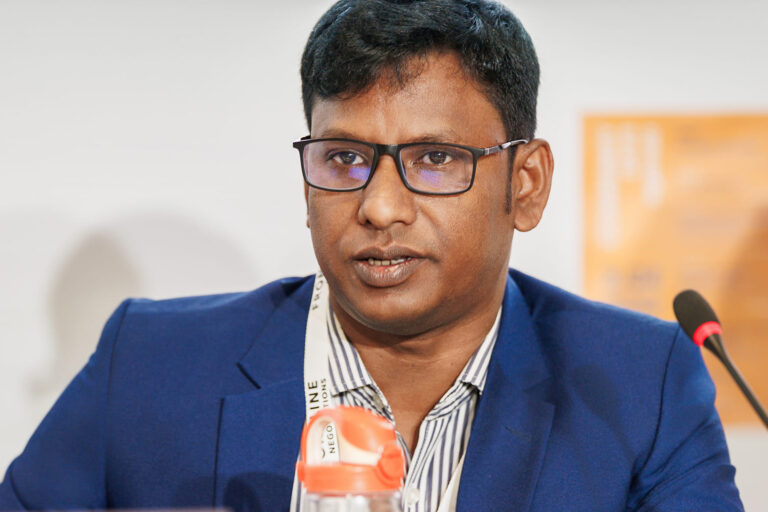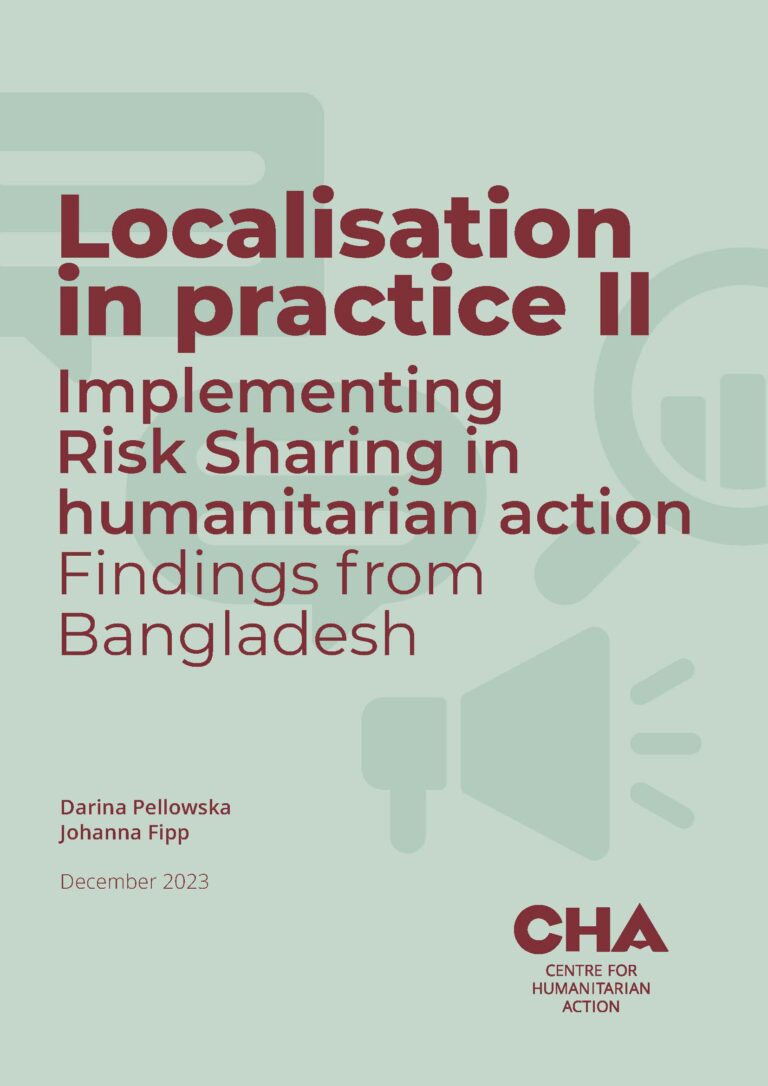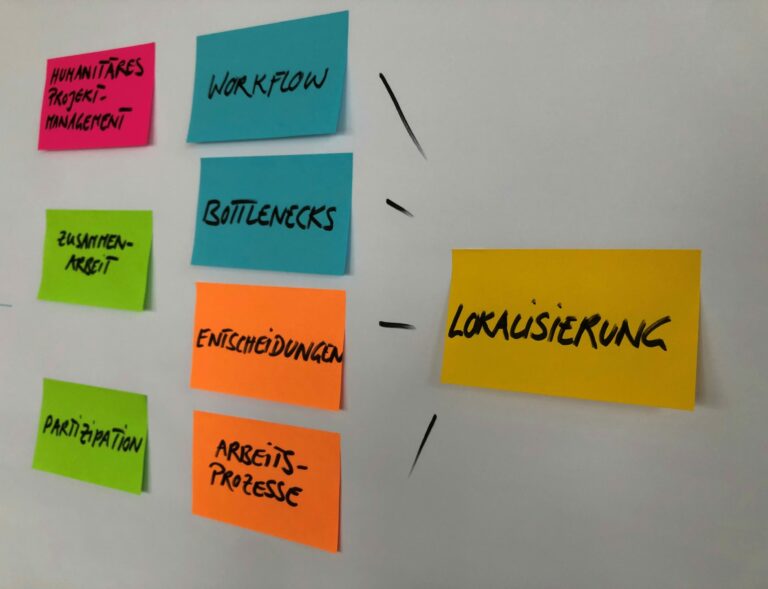| Author: | Abdul Mannan |
| Date: | 28. July 2025 |
…and How It Can Be Strengthened
The Rohingya humanitarian crisis, now entering its eighth year, underscores the importance of localisation—empowering local organisations to lead and sustain humanitarian responses. Although overall funding for the response has shown a declining trend, the recent influx of refugees has sharply increased demand for humanitarian assistance. This growing pressure necessitates greater efficiency in the Rohingya response, and localisation is increasingly recognized as a critical strategy to enhance effectiveness and optimize resource utilization. Localisation can lead to more effective, contextually relevant, and sustainable aid. Local NGOs (LNGOs) are increasingly seen as central to this process. In a setting as complex as the Rohingya crisis, where international aid faces limitations due to funding shortfalls and shifting global priorities, the potential of local leadership is immense. Recent disruptions, such as the freeze in USAID funding, have increased the urgency for localisation. The freeze has revealed the limitations of international aid and may serve as a necessary trigger for the reforms needed to enable local organisations to assume more leadership. Leadership capacity within LNGOs refers to essential competencies including strategic vision, financial stewardship, advocacy for resources, stakeholder coordination, and adaptive management. Building these skills is critical for LNGOs to effectively navigate the complexities of humanitarian response and to assume greater ownership over program design and implementation. This article explores how strengthening leadership within these local organisations can enable them to capitalise on the opportunities for localisation, creating a more resilient and self-reliant humanitarian response.
The Role of Leadership in Localisation
Leadership is fundamental to enabling local organisations to navigate the complexities of humanitarian work, manage resources effectively, and gain credibility with international partners. Strengthened leadership skills among LNGO leaders can help them better advocate for funding, manage programs, and collaborate with various stakeholders, including international NGOs (INGOs) and donor agencies. Strong leadership fosters organisational resilience, accountability, and strategic vision—key factors for capitalising on localisation.
Pathways for Leadership Capacity Enhancement
To strengthen leadership within LNGOs and enhance their role in the Rohingya humanitarian response, several strategies should be pursued:
- Establishing Tailored Leadership Development Programs
Donors and INGOs should invest in leadership programs focused on strategic planning, financial management, and advocacy. LNGOs must also take responsibility for developing their own leadership pipelines internally, ensuring sustainability beyond external support. - Fostering Strategic Partnerships with INGOs
Partnerships with INGOs offer valuable mentorship opportunities for LNGO leaders. However, LNGOs should also create internal mentoring structures to reduce dependency and combat brain drain, fostering long-term leadership growth. - Encouraging Flexible Funding for Capacity Building
Donors should provide flexible funding models that allow LNGOs to invest in leadership training, internal development, and staff retention, supporting long-term resilience. - Building a Strong Organisational Culture
LNGOs must prioritise leadership development through clear career paths, internal training programs, and promotion from within to reduce turnover and retain skilled leaders, ensuring continuity and growth. - Advocating for Greater Representation in Decision-Making
LNGOs need to advocate for increased representation in decision-making forums, ensuring local perspectives are included in policy and program design, and enabling them to shape the strategic direction of humanitarian efforts.
Addressing Brain Drain and the Impact of the USAID Freeze
Despite the positive steps outlined above, one critical issue remains: the high staff turnover and talent drain to INGOs and UN agencies, which has been exacerbated by funding dynamics such as the USAID freeze. While the freeze may have constrained the hiring capacity of larger international organisations, potentially reducing some outward migration, LNGOs continue to face significant challenges in retaining their best talent. Mentoring and training programs can help develop leadership capacity but are insufficient on their own to fully address brain drain. Therefore, LNGOs must explore innovative strategies to retain skilled professionals and ensure sustainable leadership.
One approach is for LNGOs to engage in more outspoken advocacy for higher salaries and better benefits for their staff, particularly for leadership roles. By lobbying for better compensation packages, LNGOs can compete with INGOs and retain skilled professionals. However, beyond financial incentives, LNGOs must also work to create a more engaging and supportive working environment that prioritises professional growth, job satisfaction, and organisational stability.
In the wake of the USAID freeze, LNGOs must also explore alternative funding sources, diversifying their revenue streams to reduce reliance on external aid. This could include building partnerships with local businesses, exploring philanthropy, and engaging in social enterprise models. By securing more sustainable funding, LNGOs can invest in their own growth and ensure they are not subject to the unpredictability of external donor funding.
Ultimately, to strengthen leadership in LNGOs and make the localisation agenda a success, LNGOs will need to confront some uncomfortable truths. They must take ownership of their leadership development, invest in long-term organisational growth, and engage in bold advocacy to secure greater financial and strategic independence. Only by making these bold, structural changes will LNGOs be able to play a more prominent role in the humanitarian response and ensure that localisation is not just a buzzword but a transformative reality.
The Path Forward: Strengthening Leadership for Localisation
Strengthening leadership within LNGOs is essential to unlocking the full potential of localisation in the Rohingya response. Equipping leaders with competencies in strategic planning, stakeholder engagement, and resource management will enable LNGOs to assume a more prominent role in humanitarian crises. Achieving this, however, requires coordinated efforts among INGOs, donors, and LNGOs themselves. Given the existing constraints in expertise and funding, LNGOs should prioritise scalable and cost-effective leadership development initiatives—such as targeted mentorship programs and the leveraging of existing partnerships—as initial steps toward building sustainable capacity. Localisation presents a unique opportunity to establish a more resilient, locally led humanitarian system in Rohingya Humanitarian Response. By investing strategically in leadership development, LNGOs can enhance their impact, strengthen community resilience, and position themselves as indispensable actors in the humanitarian landscape, ultimately driving greater efficiency and sustainability in aid delivery.
Abdul Mannan is a humanitarian professional with over 18 years of experience and serves currently as the Deputy Director of Program Development, MEAL, and External Relations at SHED in Cox’s Bazar, Bangladesh.






Timely, thought provoking and deeper analytical write up. I review the article, really valuable one. LNGO’s existing senior have to prioritize initiative for building internal leadership and also nurture the process for achieving sustainable dynamic leaders with international foresight.